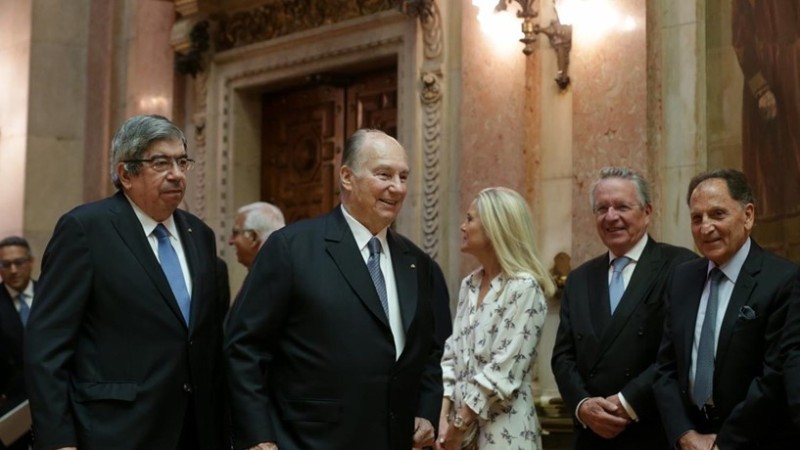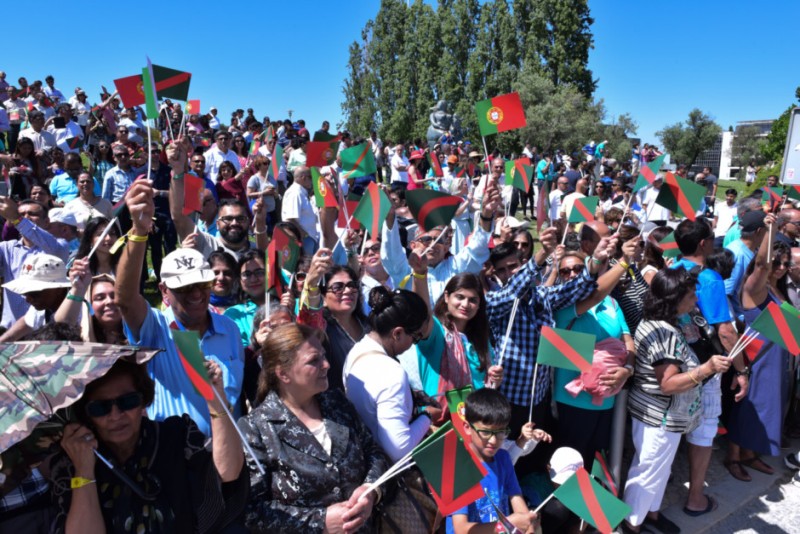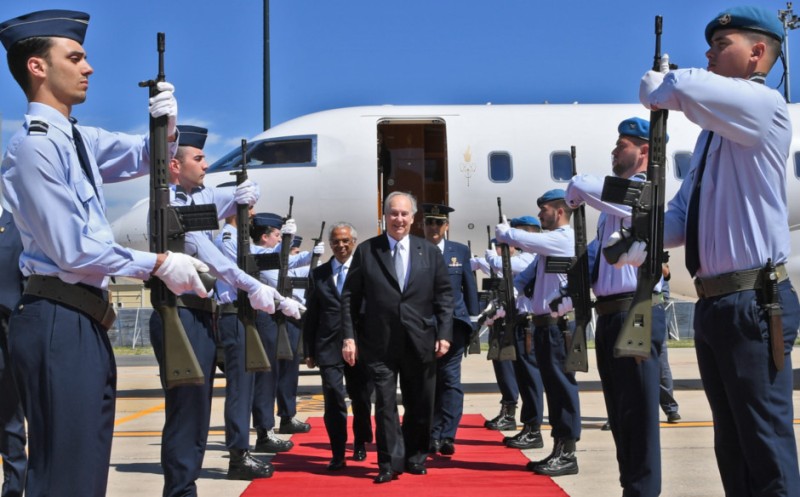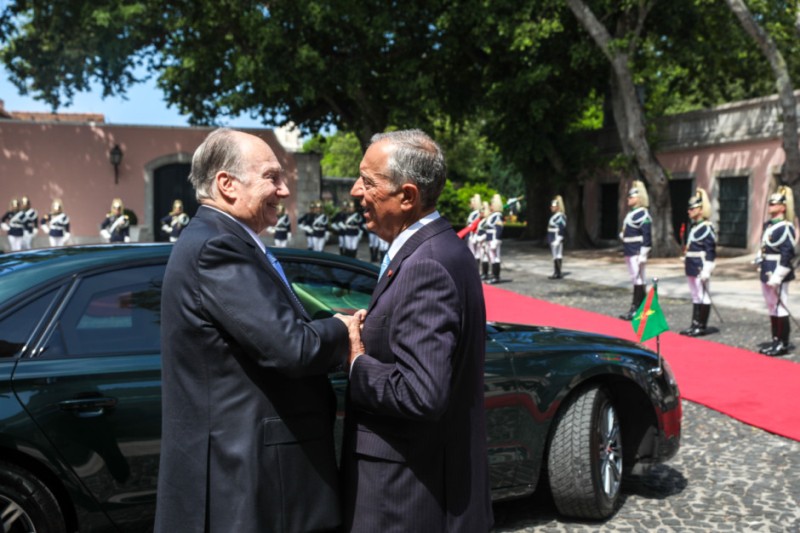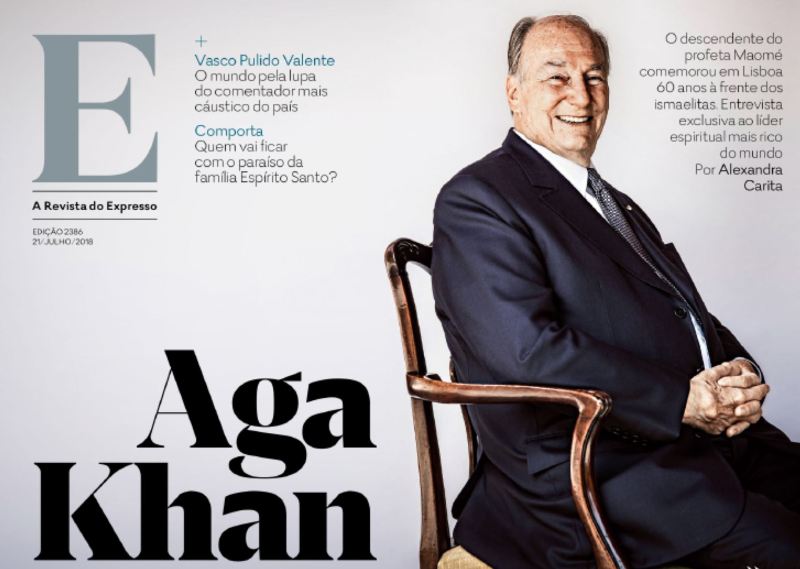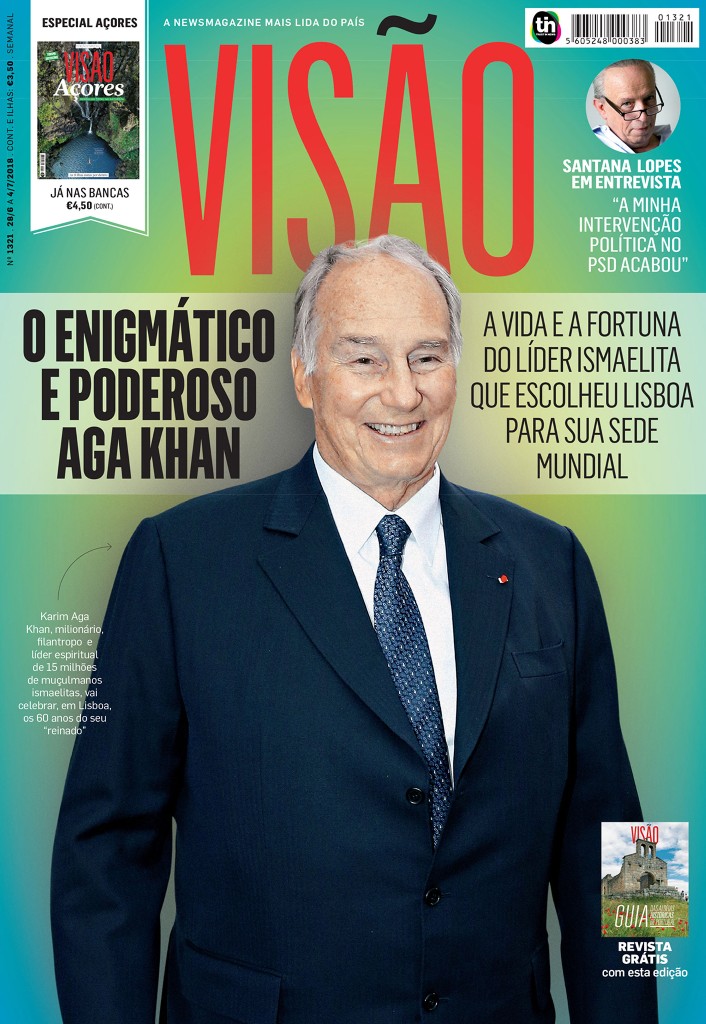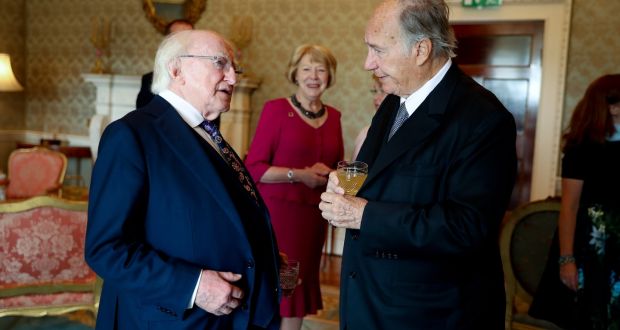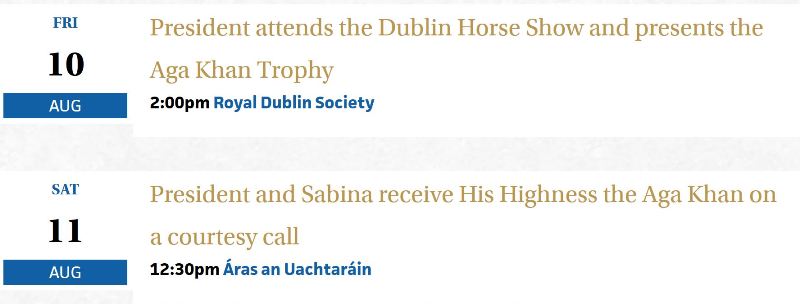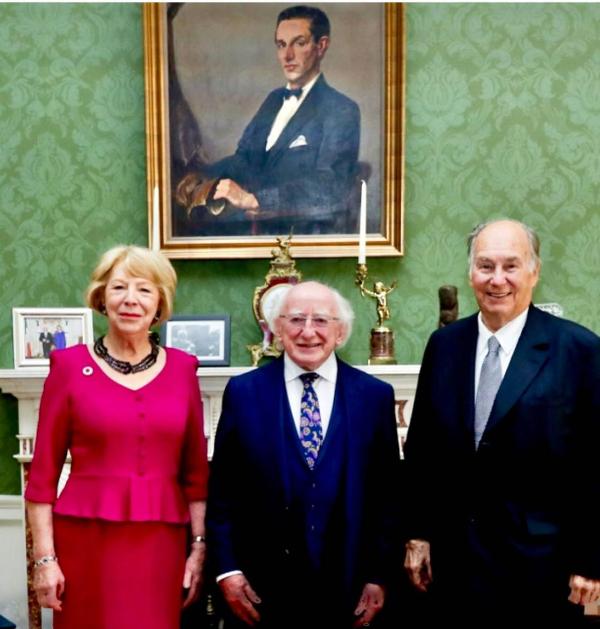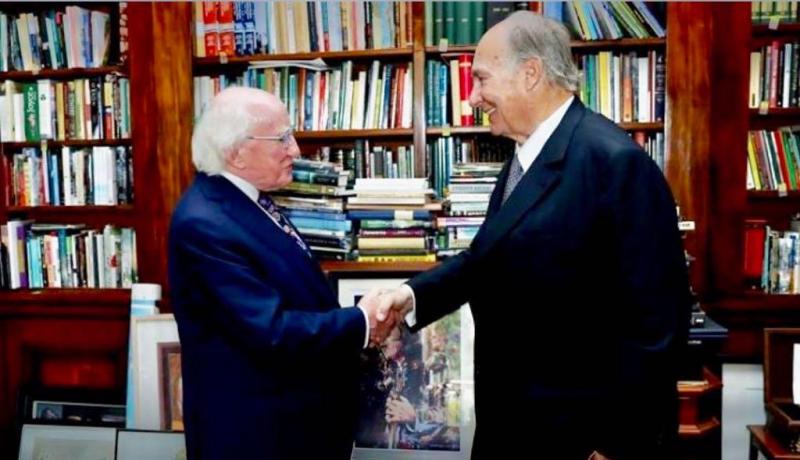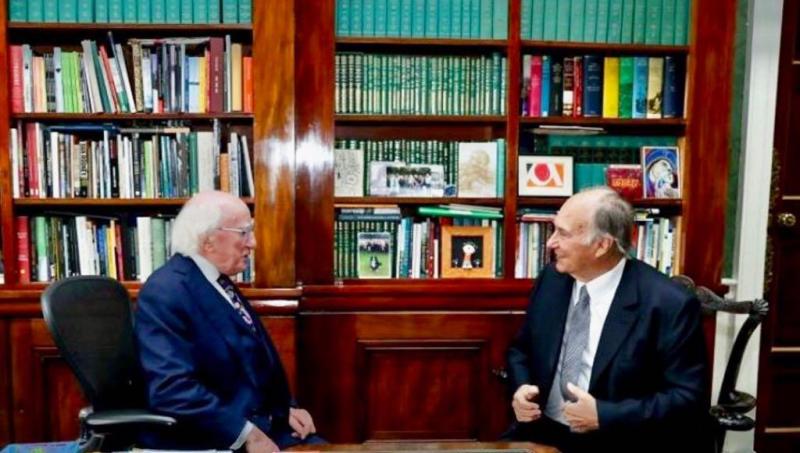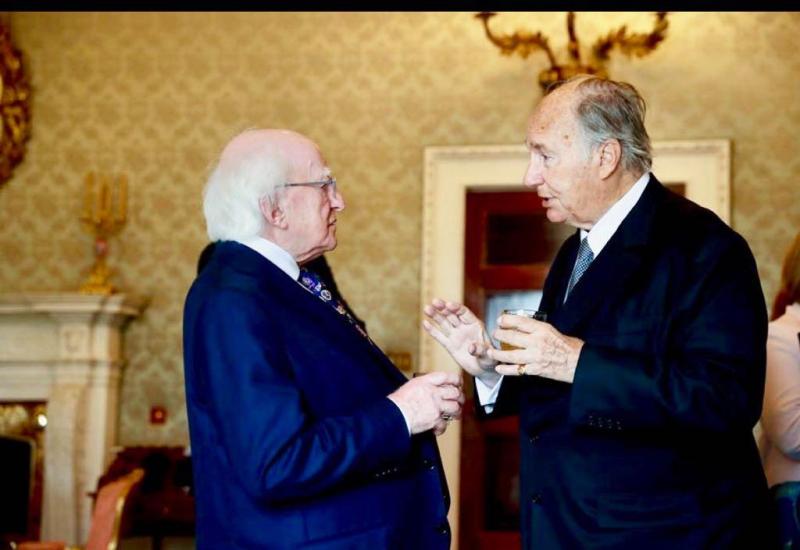Expresso Portugal Article on Ismaili Community and His Highness the Aga Khan
BY ISMAILIMAIL POSTED ON AUGUST 3, 2018
Expert translation by Sadiq Habib who is also featured in this article. With special permission.
“When the king went to Évora, everyone went to Évora. It will be the same with the Aga Khan.”
FOTO MARK BLINCH/REUTERS
He is “a mix of king, Pope and living God” and moves crowds–as will become clear in the coming days, with the arrival of thousands of faithful to Portugal, to attend the celebrations of his 60 years as leader of the Ismaili Muslims. Some think he will continue to do so, after installing the global headquarters of his community here, in the fashion of kings of yore. One Ismaili, who came from London to take part in the the celebrations, warns: “Our integration here has been successful, but that should not be taken as meaning that there is no racism or Islamophobia in Portugal.”
TEXT HELENA BENTO
The “security of Portugal”, when compared with other countries where the Ismaili Muslim community is installed, has been presented by historians and other experts as the criterion that determined the choice of this country as host of the world headquarters of the Ismaili Imamat, to be inaugurated soon.
Sadiq Habib, an anthropologist and researcher based in the United Kingdom, and himself a member of this religious community, agrees, but immediately warns that “celebratory and exceptionalist speeches must be avoided”. “Our integration here was successful, but this should not be taken as meaning an absence of racism and Islamophobia in Portugal. Certain discourses seek to deny or downplay the existence of these situations, but they do exist”, he tells Expresso.
At 33, Sadiq Habib is part of the first generation of Ismaili Muslims to be born in Portugal, after the community settled in the country following the Carnation Revolution of April 25. He is pleased with the installation in our country of the world headquarters of the branch of Islam to which he belongs: “We are grateful to Portugal for having welcomed us in such a positive way, making possible the installation of the headquarters here. This is the result of a process of several years, involving several governments, allowing a meeting of wills.”
The mansion which will house the future headquarters of the Ismaili Imamat in Lisbon (after an investment of around 12 million Euros) is the Palacete Henrique Mendonça, where the headquarters of the Nova School of Business & Economics was located. It will be one of the stops in the itinerary of Prince Karim al-Hussayni—titled Aga Khan IV and claiming descent from the Prophet Muhammad—who is visiting Portugal to celebrate his 60 years as leader of the 15 million people who make up the global religious community of Shiite Muslims.
The celebrations begin this Friday, July 6, and continue until the 12th. 45 thousand faithful are expected to partake—a number that may nevertheless be exceeded, as explained to Expresso by a source from the Ismaili Imamat in Portugal, which oversees the Aga Khan Foundation in Portugal (AKFP). The Aga Khan will be staying in a hotel in the capital and will be received by the President of the Republic, Marcelo Rebelo de Sousa, in the Palace of Belém. He will also meet with the Prime Minister, António Costa, in the Foz Palace.
WHAT DOES THIS MEAN TO ME? “IT IS DIFFICULT TO EXPRESS IN WORDS”
Sadiq Habib, a researcher and specialist in Islamic studies, who travelled from London to take part in the celebrations, does not hide the “pride” of being here. “The community is celebrating a milestone in its 1400-year history. Obviously, being a member, I am here with great joy. The Jubilee [Diamond Jubilee, name given to the commemorations of the 60th anniversary, which began in July last year and ends now in Portugal] is always a milestone in the life of a community like ours,” says Sadiq, acknowledging the “difficulty in expressing in words” the importance of this event.
But he continues: “It is a source of happiness for me, and for all those coming from all corners of the world to celebrate this event, that it is possible to have this celebration in the present conditions, particularly given that ours is a minority community, one which has not always had a positive history within Islam, with moments of conflict and persecution, and even genocide. It is a unique occasion and a very rare event in the lives of Ismaili Muslims.”
Ismaili Center of Lisbon, in Laranjeiras, Lisbon D.R.
Ismaili Center of Lisbon, in Laranjeiras, Lisbon DR
The choice of Portugal to install the world headquarters of the Imamat was a personal decision of Prince Aga Khan, causing many to ask,—but why Portugal, where there are estimated to be only about 7,000 Ismaili Muslims? From the Ismaili Imamat in Portugal, we are told that: “Portugal is a country that the Aga Khan knows very well. He has visited several times and has many friends here.”
A third reason will have to do with the fact that the prince “considers Portugal a country of great tolerance and historically very open to the world, which is, a bit like the entity that he himself directs, a supranational entity.” “The Aga Khan is not a prince of a country or a state, he is the leader of a community that lives all over the world and is absolutely ultra-national.”
Mainly from Pakistan, India and the eastern coast of Africa, Ismaili Muslims left these countries after British decolonization and became more present in the Anglo-Saxon world, such as Canada and England, but also in Portugal, where they settled after the Carnation Revolution of April 25.
The Aga Khan Foundation was created in 1983. “They left Mozambique with money and without crisis. They came here and started making lots of money again. For a long time, they owned all the furniture stores of Almirante ReisFOOTNOTE: Footnote. When the profitability of that business started to fall, they moved to restaurants,” says José Pereira Bastos, an anthropologist who specializes in ethnic minorities and teaches at the Faculty of Social and Human Sciences at the Universidade Nova de Lisboa.
Currently, Ismaili Muslims have a presence in the business and academic elites of some 30 countries through the Aga Khan Development Network (AKDN). In Portugal, they continue to trade in furniture, clothing and hotels, owning the Vip Hotels chain, with hotels in the continent, Azores and Mozambique, and the Azinor group, owner of the Sana chain, with more than 10 hotel units in Portugal and others in countries such as Germany and Angola.
The main investments have been in the construction of hospitals, mosques, universities and schools, and in support of development programs in various regions. José Gabriel Pereira Bastos traces the profile of the community: “It has a good image, totally non-conflictual and uninvolved in international conflicts, and exemplarily peaceful. Of all the communities with Indian roots in Portugal, it is the most developed, it is well above and beyond the others in this sense. It is very organized and has medium-term planning, to the point that I consider them to be more a multinational than a religion, although obviously it [Ismaili Islam] is also a religion.”
Also, the “security factor” was, in this anthropologist’s opinion, crucial for the choice of Portugal. “In no other country would they have the security that they have here. For Muslims, we are the country where there are no crimes against Muslims or terrorism. The gerigonçaFOOTNOTE: Footnote in power also helps, given this government’s openness to the various ethnicities.”
PHOTO JOS & Eacute; Caria
PHOTO JOSEPH CARIA
The purchase of the Palacete Henrique Mendonça to install the world headquarters of the Ismaili Imamat was, as reported by the Público newspaper, approved by the Ministerial Council shortly after the Aga Khan family contributed with 200 thousand euros to the public campaign towards the acquisition of the painting “Adoration of Magicians”, by the painter Domingos Sequeira, in 2016.
The AKDN would also come to donate 500,000 euros to scholarships for children whose families were victims of the Pedrógão fires, and to sign an agreement with the Portuguese government to award 10 million Euros in research scholarships. “At one point the realization arrived that it would be useful to create a seat to serve as the center of all the offices and entities scattered around the world,” explains a source from the Ismaili Imamat in Portugal.
Sadiq Habib says he was caught unawares by the announcement of the installation of the headquarters in Portugal. “I had no idea it was coming here, I saw it on the news. There was a dialogue with other countries, but the Imam will have had his reasons for having chosen Portugal.” But do you agree with the decision? “It is not for me to agree or disagree. As a member of the community I am happy, as a researcher I have to try to understand,” says Sadiq.
WHAT BENEFITS FOR PORTUGAL AND VICE VERSA?
The advantages for Portugal in hosting the world headquarters of the community are, in the opinion of José Pereira Bastos, “evident”. “The Aga Khan is a mixture of king, Pope, and living God. He is very discreet, very ‘low-profile’, but also very powerful from the economic and international point of view. He has a very strong connection with Britain. There’s a lot of money at stake.” The installation of the headquarters in Portuguese territory “will reinforce”, therefore, “Portugal’s international political and economic position”. “First it was GuterresFOOTNOTE: Footnote, then CentenoFOOTNOTE: Footnote, then António VitorinoFOOTNOTE: Footnote and now it’s the Aga Khan here in Portugal,” the researcher points out.
Another advantage, not political or diplomatic, but social and demographic, will be the possibility that the prince’s move “will stop the flow of people with Indian roots that are leaving the country en masse.” “I know the reality of the Hindu community in Portugal. A few years ago they were ten thousand, today they are about four thousand. They are all moving to London and Manchester, only the elders and a few children are staying. And this flow obviously harms Portugal immensely, due to our negative demography”, says José Pereira Bastos, for whom the prince’s coming to Portugal could reverse this situation.
“With the Aga Khan here, it all changes. The monies, the investments, the businesses all return. It was the same at the time of the monarchy. When the king went to Évora, everyone went to Évora. When he moved to Santarém, everyone went to Santarém. And if the Aga Khan comes to Portugal, then everyone will come after him, entire families, everything.”
The Henrique Mendonça Palace, in Lisbon, was sold by the State & agrave; Aga Khan Foundation, which will install there, its world headquarters PHOTO D.R.
The Henrique Mendonça Palace in Lisbon was sold by the government to the Aga Khan Foundation, which will set up its world headquarters PHOTO DR
Jorge Malheiros, a specialist in migration and researcher at the Center for Geographical Studies of the Institute of Geography and Spatial Planning of the University of Lisbon, considers that the installation of the headquarters of the Ismaili Imamat and the official residence of Prince Aga Khan in Portugal may “open doors to new economic and political relations with other continents, namely Asia and Africa, or even countries like Canada, where there is also a relevant Ismaili community.”
“The Ismailis are big influencers.” It will also interest the country, the researcher continues, “to have specific groups such as the Ismailis to attract interest in the country” besides “iconic figures such as the singer Madonna.”
The specialist in migrations says that there is additionally a symbolic element to be considered: “The political discourse has been based on notions of interculturality and religious diversity, and welcoming this headquarters has legitimized this discourse.” Unlike the expert previously mentioned, Jorge Malheiros does not see in the Aga Khan the same capacity to influence of old Portuguese monarchs. “I do not think his presence will be reflected in a huge growth in direct investments. From the point of view of financial management and projects, certainly more things will happen here, but that does not mean that the investment is made in Portugal.”
In the next few days, Sadiq Habib will have the opportunity to be very close to Prince Aga Khan. This is not the first time this has happened, but it is always a moment of great solemnity. We asked him what he most admired in the leader of his community, but Sadiq prefers to highlight one of the projects created, in 1977, by the Aga Khan—the Aga Khan Award for Architecture, which, in his words, promotes ​​those which are also the values ​​of Islam. “There is an integral understanding of architecture. not only as construction but also as social intervention. And in a world and a context where everyone shouts and seeks to affirm their religious values ​​through violence and coercion, this award is exemplary in the way it shows what Muslim civilization is.”
http://leitor.expresso.pt/diario/05-07- ... -ser-igual
